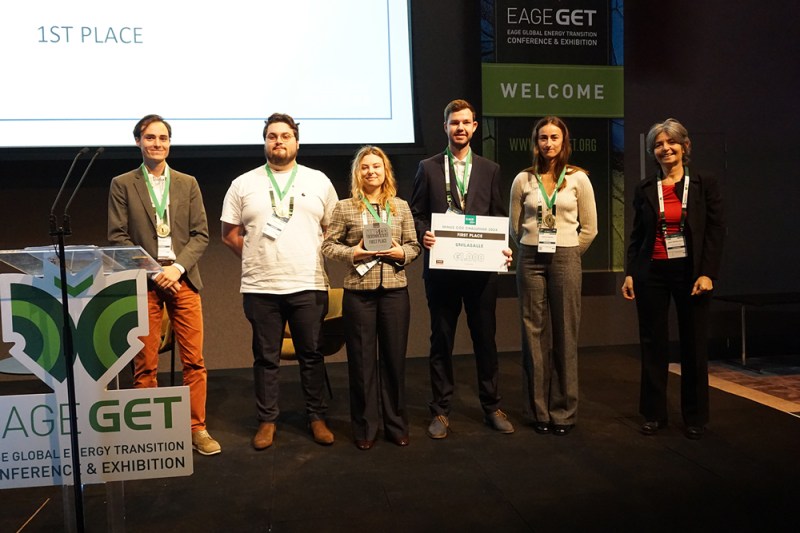What is the Minus CO2 Challenge?
The world is changing – and the challenge of climate change is impacting the oil and gas business in many ways. In the Minus CO2 contest, we challenge teams to work with a dataset of a carbon sequestration project.
The Minus CO2 Challenge 2025 main topic will be ‘Carbon Storage & Energy Storage in Cambro-Ordovician Saline Aquifer Systems: North America & Worldwide’.
We invite university teams of three to five students to apply to take part in this innovative challenge, which the EAGE Student Fund supports.

To ensure a successful application you should be aware of the EAGE Minus CO2 Challenge 2025 Rules and Procedures.
Application Deadline: 18 May
Minus CO2 Challenge Finals
The finals of the Minus CO2 Challenge 2025 will be held at the EAGE GET Conference in Rotterdam (The Netherlands).
The selected winners will then have the opportunity to showcase their innovative project on a special session.
Don’t miss this insightful presentation!

Contact us
Please find more information about this challenge here.
If you have any further question, do not hesitate to contact us.
The world is changing – and the challenge of climate change is impacting the oil and gas business in many ways. In the Minus CO2 contest, we challenge teams to work with a dataset of a carbon sequestration project.
The Minus CO2 Challenge 2025 main topic will be ‘Carbon Storage & Energy Storage in Cambro-Ordovician Saline Aquifer Systems: North America & Worldwide’.
We invite university teams of three to five students to apply to take part in this innovative challenge, which the EAGE Student Fund supports.
The finals of the Minus CO2 Challenge 2025 will be held at the EAGE GET Conference in Rotterdam (The Netherlands).
The selected winners will then have the opportunity to showcase their innovative project on a special session.
Don’t miss this insightful presentation!
The finals of the Minus CO2 Challenge 2025 will be held at the EAGE GET Conference in Rotterdam (The Netherlands).
The selected winners will then have the opportunity to showcase their innovative project on a special session.
Don’t miss this insightful presentation!
Contact us
Please find more information about this challenge here.
If you have any further question, do not hesitate to contact us.
Applications
Teams Received Data Set
First Round Submission
6 Teams Advancing to Round 2 Announcement
Round 2 Submission
10-minute presentations by the 6 teams
Finals at GET25
Looking forward to welcoming you in Rotterdam, this 27 – 31 October 2025!
EAGE is the largest global community of research and industry geo-professionals dedicated to supporting a multi-disciplinary approach to the investigation of the Earth’s subsurface.
for GET2024
Tell Us What You Think!
Thanks for using the Event Assistant (beta)! Got a minute? Share your feedback and help us make it even better.
Share your feedback and help us make it even better
COO, XGS Energy
Co-chair Geothermal Energy Conference
As the Chief Operating Officer at XGS Energy, Dr. Ghazal Izadi plays a pivotal role in driving global operations, spearheading technology advancement, and company expansion efforts. With over a decade of experience, she is a driving force at XGS Energy. Her expertise and leadership are deeply rooted in creating and delivering technology-centric business solutions, marked by exceptional client service.
Before joining XGS Energy in 2022, Dr. Izadi held key technical positions at Baker Hughes, making significant contributions in both Unconventional oil and gas as well as Geothermal domains. Her responsibilities encompassed overseeing reservoir technical services across North and Latin America, Middle East, and APAC regions. This rich background reflects her commitment to a holistic approach, spanning from subsurface insights to well construction and tailored surface geothermal facility design. Dr. Izadi earned her Ph.D. from Penn State University, specializing in a diverse range of areas such as computational geomechanics, fluid transport in fractured and porous media, applied rock mechanics, and Advanced/Enhanced Geothermal Systems. Her profound expertise extends to authoring or co authoring more than 40 technical papers, further cementing her reputation as a notable figure in the field.
Head of Geosolutions at Geocento
Co-chair Geothermal Energy Conference